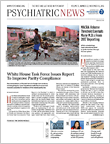A study of more than one million young patients in Denmark suggests that women using hormonal contraception were more likely to be diagnosed with depression or prescribed an antidepressant for the first time than those not taking the medication. However, several experts say clinicians and patients should be cautious about jumping to conclusions about the results.
The study drew on data from national psychiatric and prescription registers covering more than 1 million women with an average age of 24 years.
Compared with nonusers, users of combined oral contraceptives experienced a relative risk of a first use of antidepressants of 1.2, wrote Charlotte Wessel Skovlund, M.Sc., and colleagues from the Department of Gynecology at the University of Copenhagen, posted in JAMA Psychiatry on September 28. Women using medroxyprogesterone acetate depot had the highest relative risk at 2.7, the highest in the study. The relative risks of a first diagnosis of depression were in a similar range.
The results were statistically significant, given the large number of patients, but should not be surprising.
“There are many instances in which women may demonstrate a sensitivity to hormonal shifts in their body—think of premenstrual syndrome, pregnancy-related mood changes, and postpartum depression—so it is not surprising that some women may experience increases in anxiety or depression when using hormonal contraception,” said Barbara Levy, M.D., vice president of policy for the American College of Obstetricians and Gynecologists. “Each woman’s response to hormonal shifts is unique to them. For many women, hormonal contraception will continue to be a good option with limited side effects.”
The researchers noted that outcomes varied by age, with younger patients apparently more sensitive than older to the effects of hormonal contraceptives, wrote Skovlund and colleagues. “This finding could be influenced by attrition of susceptibility, but also that adolescent girls are more vulnerable to risk factors for depression.”
The findings should not lead to precipitous action by patients or their physicians, said former APA President Nada Stotland, M.D., in an interview. While the effects are statistically significant, clinicians must compare them to what could happen if women were not on hormonal contraceptives.
“Women, especially adolescents, who are not taking these contraceptives may instead experience anxiety about negotiating with partners or getting pregnant,” said Stotland. “We must take into account the importance of contraception as an important element of women’s overall health, including mental health.”
Finally, while the relative risk is elevated in women using contraceptives, the degree of elevation is not alarming, said Maureen Van Niel, M.D., president of the APA Women’s Caucus and a private practitioner in Cambridge, Mass. “Given the relatively significant overall incidence of depression in women post puberty, it would be interesting to see the actual numbers for the overall incidence of depression on and off birth control.”
In any case, selecting the right contraception should be a shared decision between a woman and her health care provider, said Levy. ■
“Association of Hormonal Contraception With Depression” can be accessed
here.
